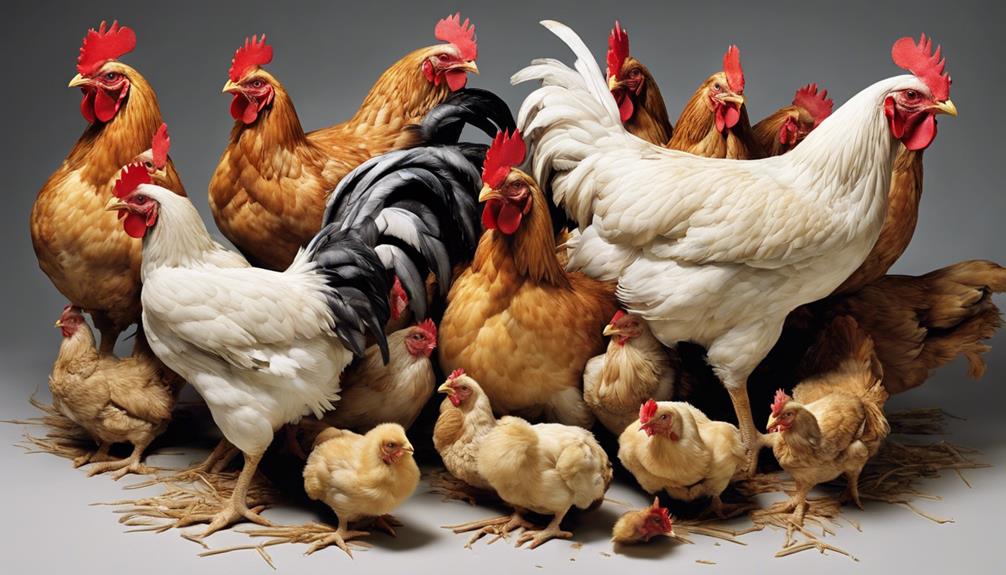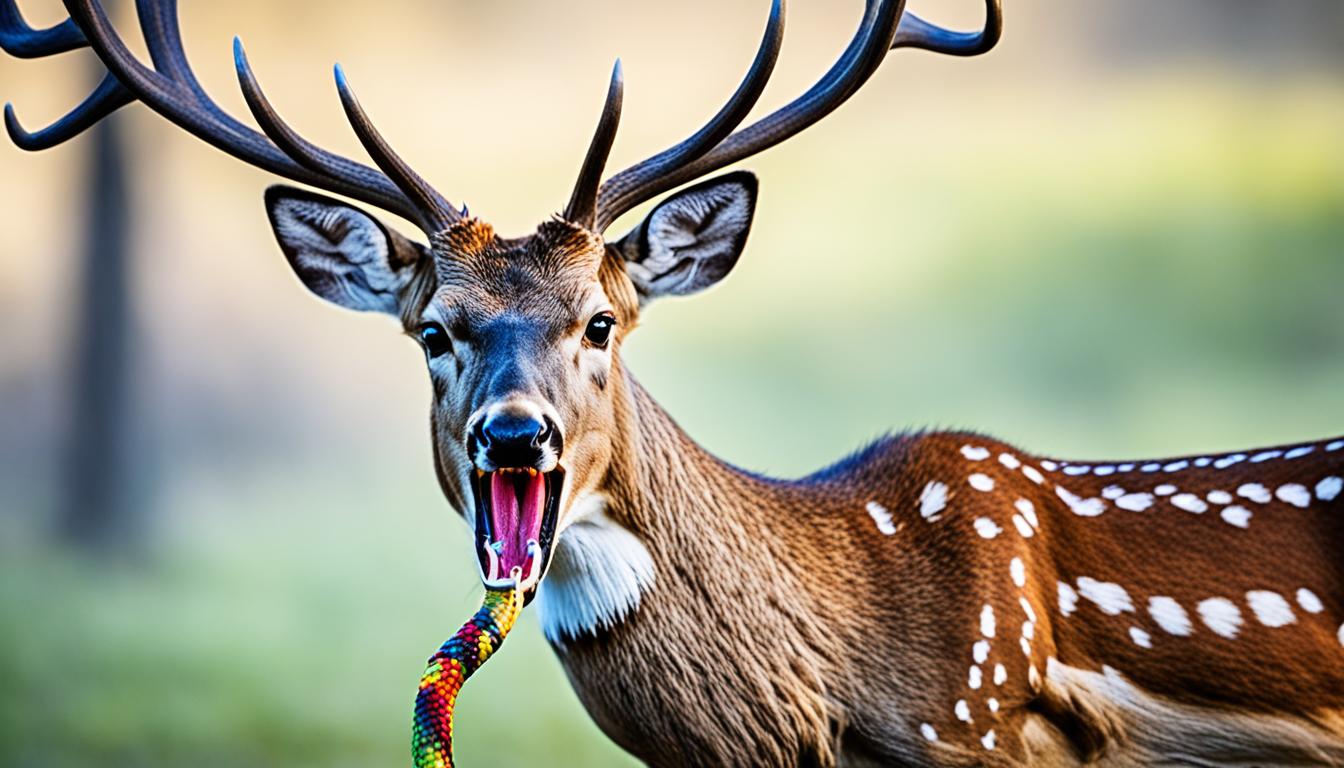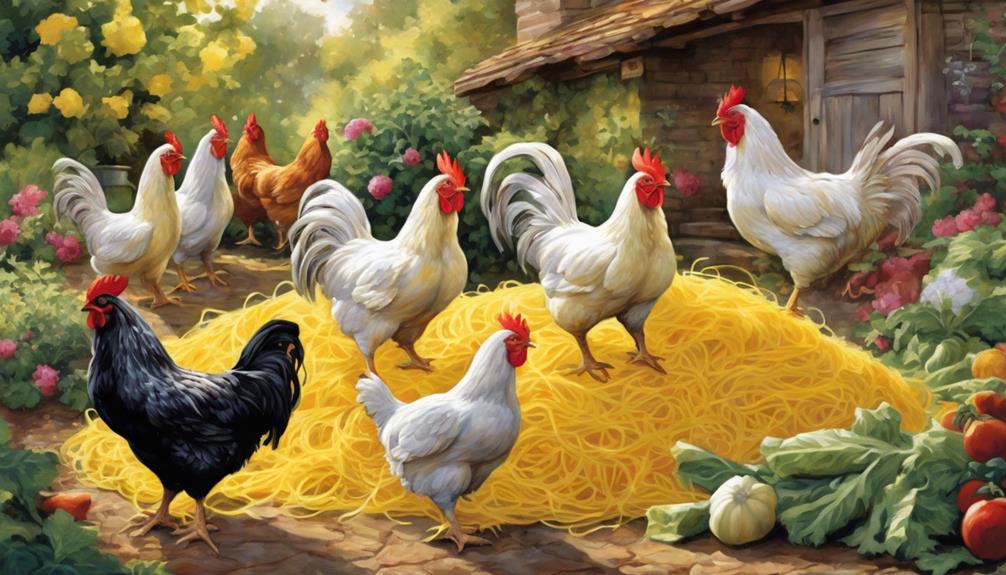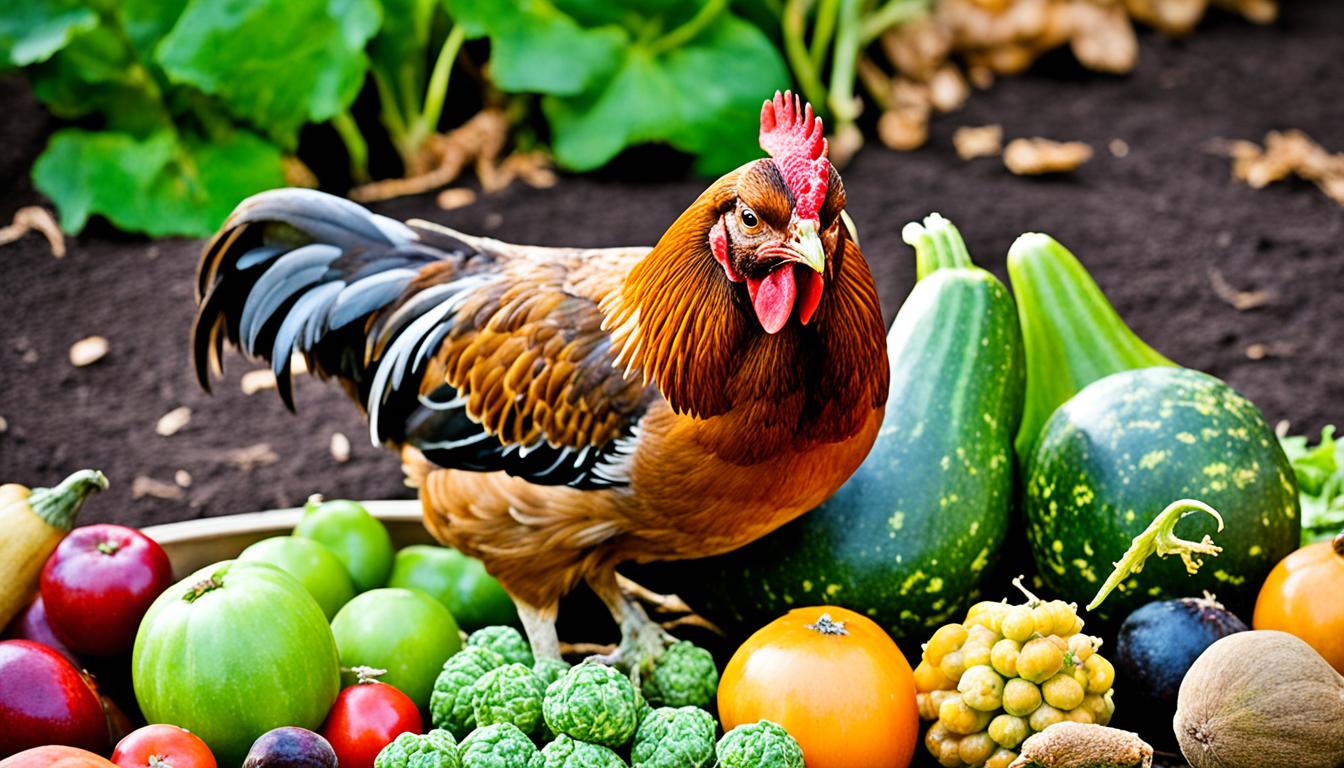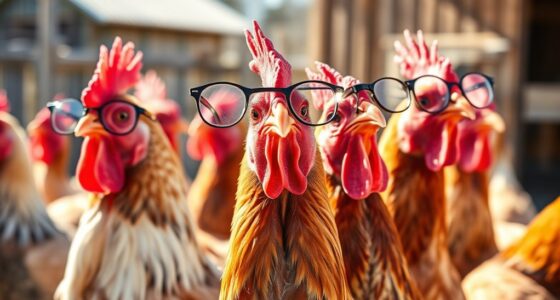We have noticed that chickens can experience sadness when another chicken passes away. They develop strong emotional connections within their flock, which can cause deep distress when a member dies. This sorrow can manifest in behavioral changes, including depression, silence, and even a refusal to eat or drink. Mourning ceremonies among chickens are quite common, with demonstrations of empathy, distress, and changes in flock dynamics after a loss.
Supporting grieving chickens through attention, a calm environment, and gradual introductions can aid in their emotional recovery. The depth of emotions and behaviors chickens display in response to loss may surprise you.
Key Takeaways
- Chickens form strong emotional bonds within flocks.
- Loss triggers mourning rituals and emotional distress.
- Behavioral changes include depression and refusal to eat.
- Flock dynamics shift, with reorganization of hierarchies.
- Supporting grieving chickens involves providing extra care and a calm environment.
Social Dynamics in Chicken Flocks
In examining the social dynamics within chicken flocks, we observe the formation of strong emotional bonds that underpin their interconnected relationships. Chickens, known for their social nature, establish intricate hierarchies and develop close ties within their flock.
When a member of the flock passes away, the remaining chickens can experience profound emotional distress. They mourn the death of their companion, exhibiting behaviors such as changes in vocalization, decreased activity, and signs of sadness like isolation and disinterest in usual activities.
The loss of a coop mate can lead to a temporary halt in egg production as chickens prioritize emotional recovery over laying eggs. Understanding these emotional responses is crucial for providing appropriate care and support to chickens experiencing loss.
Behavioral Changes After Loss
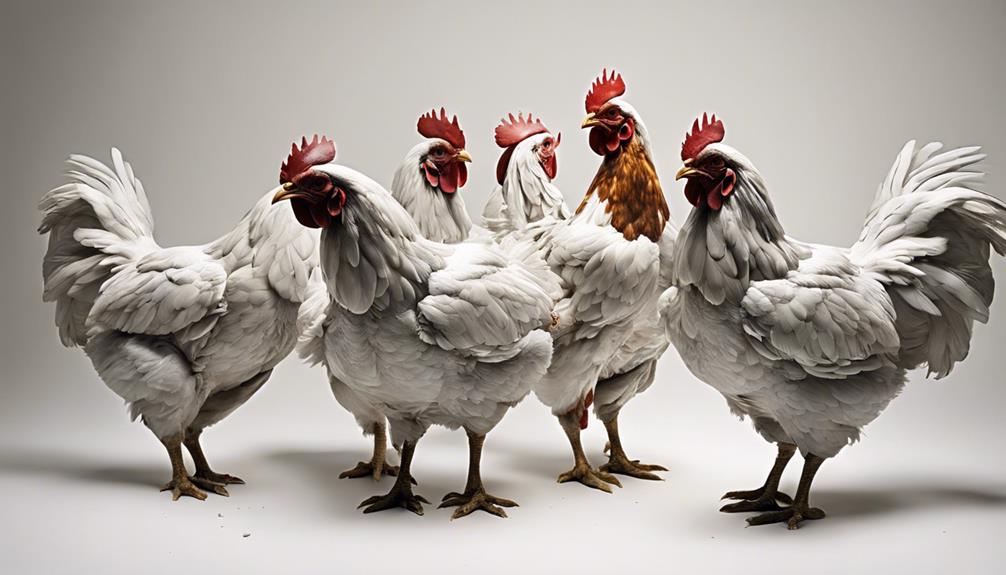
Following the loss of a flock mate, chickens often display noticeable behavioral changes, such as depression, quietness, and overreactions to stimuli. The emotional distress caused by the death of a companion can deeply affect chickens, disrupting their usual flock dynamics. This mourning behavior is a clear indication of the strong social bonds and attachment chickens can form within their flock. In times of loss, chickens may exhibit decreased appetite, changes in vocalization, and may even refuse to eat or drink. The stress from emotional distress can also lead to a temporary halt in egg production, impacting the social structure within the coop. Understanding these behavioral changes is crucial in providing proper care and support to chickens experiencing the loss of a flock member.
| Behavioral Changes After Loss | |
|---|---|
| Depression | Quietness |
| Overreactions to stimuli | Decreased appetite |
| Changes in vocalization | Refusal to eat or drink |
Mourning Rituals Among Chickens
Experiencing the loss of a flock mate, chickens demonstrate mourning rituals through changes in behavior and emotional displays. When a chicken loses a beloved flock member, it can lead to a profound impact on the remaining chickens. Some chickens may stop laying eggs, as the emotional distress can affect their normal biological functions. The absence of a sick chicken or a deceased flock member can trigger mourning rituals in chickens, leading to behaviors like decreased activity, aimless wandering, and increased vocalizations that reflect their distress.
Chickens exhibit a range of responses to loss, with some individuals withdrawing from the flock and showing signs of depression, while others may seek comfort from their companions. The emotional attachments chickens form within their flock can be strong, leading to visible displays of empathy and distress when one of their own passes away. These mourning rituals highlight the complex social dynamics and emotional lives of chickens, emphasizing the importance of companionship and social bonds within a flock.
Impact of Loss on Flock Dynamics
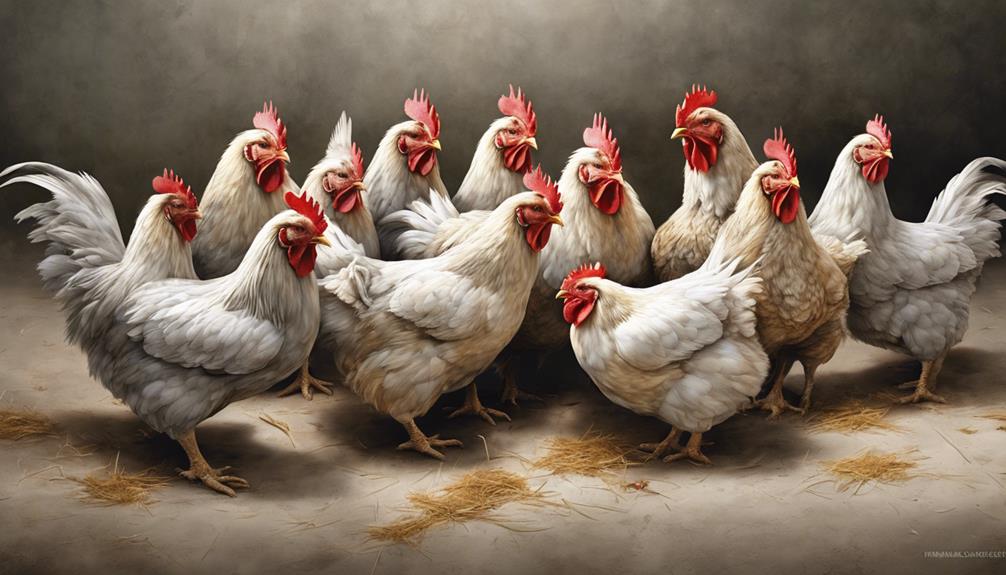
Upon losing a flock member, chickens can undergo significant emotional distress and behavioral changes, impacting the overall dynamics within the group. The absence of a chicken can lead to a reorganization of the pecking order as remaining flock members adjust to the new social landscape. Emotional responses among flock members can vary, with some chickens displaying signs of mourning through behaviors like increased vigilance, searching for the missing bird, or calling out in attempts to locate them. These visible reactions highlight the depth of emotional attachments within the flock, influencing their well-being and interactions. The loss of a chicken can create a period of adjustment for the remaining members, during which altered behaviors and emotional responses may be observed. Understanding the impact of loss on flock dynamics is crucial in recognizing the complexities of chicken social structures and the significance of individual relationships within the group.
| Emotional Responses | Impact on Pecking Order | Mourning Behaviors | Adjustments in Relationships |
|---|---|---|---|
| Increased vigilance | Reorganization | Searching for missing bird | Changes in social interactions |
Supporting Grieving Chickens
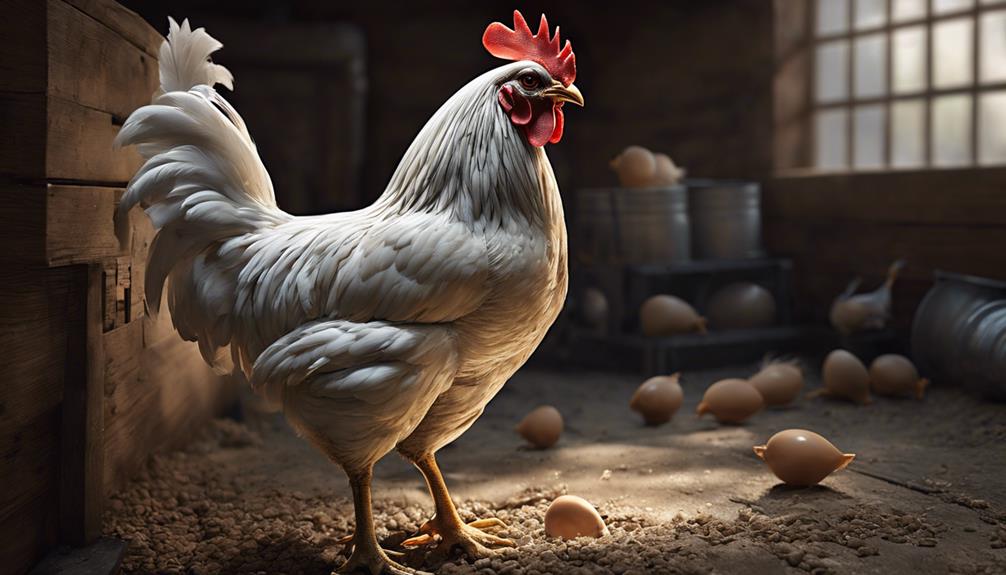
In supporting grieving chickens, providing extra care and a comforting environment can aid in their emotional recovery after the loss of a flock member. When a chicken experiences the death of another hen, it can have a profound impact on their emotional well-being. Here are three essential ways to support grieving chickens:
- Make Sure to Provide Extra Attention: Spend more time with the grieving chicken, offering comfort and reassurance. This can help alleviate their distress and make them feel less isolated during this challenging time.
- Create a Calm and Safe Environment: Chickens mind the environment they're in. Ensure that the surroundings are peaceful, secure, and conducive to healing. A quiet and safe space can help grieving chickens feel more at ease and facilitate their emotional recovery.
- Consider Introducing a New Companion Gradually: While it's essential to allow the chicken to grieve, introducing a new companion slowly can assist in their emotional recovery. Another hen can provide companionship and support as the grieving chicken adjusts to the loss.
Supporting grieving chickens with attentive care and a nurturing atmosphere can significantly aid in their healing process.
Frequently Asked Questions
Do Chickens Get Lonely When One Dies?
When one chicken dies, our flock can indeed feel lonely. The loss of a coop mate can lead to behavioral changes like quietness and distress. We may show signs of grief such as decreased appetite and changes in vocalization.
Seeking companionship, becoming more vocal, and exhibiting behaviors indicating a sense of loss are common. Providing support, companionship, and a comforting environment can help us cope with loneliness and sadness.
Do Chickens Miss Their Siblings?
We can observe that chickens form strong emotional bonds with their siblings, leading to evident distress when a sibling passes away. The loss can disrupt the flock's dynamics and trigger behavioral changes like vocalization or decreased appetite.
Providing a supportive environment and companionship can assist chickens in coping with the grief. It's intriguing how these social creatures navigate complex emotions and relationships within their flock, showcasing resilience and vulnerability simultaneously.
Do Chickens Know if One Is Missing?
We observe that chickens possess a keen awareness of their flock members' presence. This is evidenced by their ability to recognize when one is missing. This awareness stems from their strong social bonds and flock dynamics.
Signs of distress, such as decreased activity and vocalizations, further indicate their sensitivity to a missing chicken. These behaviors illuminate the depth of emotional attachment and social hierarchy within a flock, showcasing chickens' capacity to perceive when one of their members is absent.
How Do You Know if a Chicken Is Sad?
When a chicken is sad, we can observe changes in behavior like decreased appetite, quietness, and disinterest in normal activities. They may isolate themselves, seem distressed, and halt egg production due to emotional distress.
Lethargy, decreased movement, and lack of interest in food are signs of mourning. Understanding these behavioral cues helps us recognize and address the emotional needs of our chickens during times of sadness.
Can Chickens Experience Grief When Another Chicken Dies, and Does This Affect Their Ability to Jump?
Yes, chickens can experience grief when another chicken dies, and it can affect their ability to jump. How chickens jump techniques can be impacted as they may feel sad and less energetic, which can hinder their jumping ability. Grieving chickens may also exhibit reduced physical activity and overall decreased movement.
Conclusion
As we reflect on the complex emotions of chickens grieving the loss of a flock member, we're reminded of the interconnectedness of all living beings.
Just as we seek comfort in times of sorrow, chickens too experience the pain of loss.
Let's strive to understand and support these sentient creatures in their time of need, for empathy knows no bounds in the circle of life.
